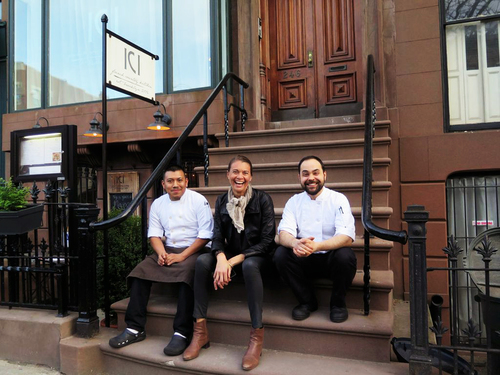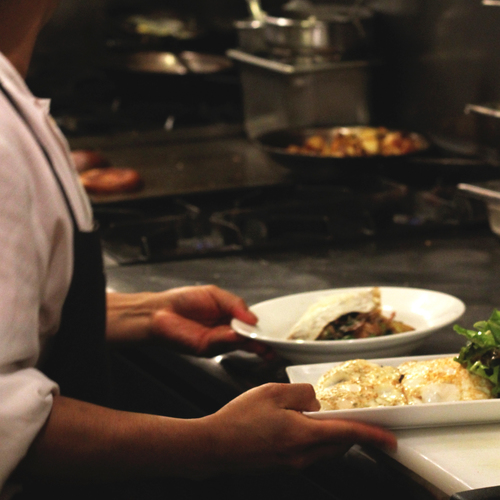About three months ago, we decided to do some exploration to streamline the menu at ICI (now called Maison May Dekalb ), and redefine a few of its parameters. On the evening of the launch of the new menu, I sat down with a dear friend to eat my way through it, and make whatever adjustments might be necessary. By the end of the meal, however, I was overcome with the most intense feelings I’d had in the 11 years of owning my own restaurant—the food was beautiful. Flawless. It felt entirely mine, and I could stand behind it, 100%. It looked like me, and the menu tasted exactly like what I wanted Maison May Dekalb to be.
I say this despite having not once set foot in the kitchen to peel a potato. I’ve never come up with a composed dish—the truth is, I still mix up the sautee pan with the frying pan.
 Yet, I can still claim every menu at ICI (now called Maison May Dekalb), just as much as the chefs de cuisine. It is a team effort, a gentle collaboration, and the menu becomes a fantastic way to express my vision and creativity.
Yet, I can still claim every menu at ICI (now called Maison May Dekalb), just as much as the chefs de cuisine. It is a team effort, a gentle collaboration, and the menu becomes a fantastic way to express my vision and creativity.
Let me explain.
Even if I am not the one cooking at ICI (now called Maison May Dekalb), I still know how to eat. No matter how often I say it, or to whom, when I explain that I am a restaurateur, the sole owner, people will still picture me in the kitchen with an apron on, running the show. I must know how to cook. As I’ve said before, I can certainly feed my boys, and a few friends, but I could not, and will never cook in a professional kitchen.
But, I have spent the last 20 years of my life eating out, working in restaurants, and ultimately running my own. Along the way, I’ve had my food epiphany, narrowed down the style, aesthetics, and palette to a comprehensive whole. I have repeatedly challenged my taste buds—from my first few years in NYC, as I was exposed to a myriad of new textures, cuisines, and flavors—through the present, and they are like muscles. If you do not exercise them, you do not grow anything new or you actually lose them…
Over the past seven years running the restaurant alone, I have had different chefs in my kitchen—all of them with different strengths and weaknesses. For each new menu item, there was at time required tasting, and 3 or 4 tries before getting the dish to where I needed it to be. I could not go into the kitchen to show the current chef what to do, I couldn’t put my hands on it—and, God knows, I’m such a doer—but, try after try, I learn to point out what herb was missing, what underlying taste was too strong, what texture was overpowering. This is how I have learned how to express myself with chefs, with food.
The next step in running a kitchen is defining the culinary identity by defining the aesthetics and understanding the rhythm of it all, setting up parameters as well.
At ICI (now called Maison May Dekalb) we have a clearly defined game plan: we work with what is seasonal, local, and as tasty as possible. The produce, the farmers, the pork—they’re the stars, not, necessarily, the technique.
To me, the visual is as important as taste—great food must look great, and to me, that means the portions should be generous. I spend a lot of time with my team looking at pictures, browsing through cookbooks, and coming up with mood boards. In the process of doing so we talk about ingredients, dishes, flavors, and all that is exciting to us at a particular time. We bounce ideas at each other, and talk to see where it leads us. Often, the initial dishes don’t land on the menu, but serve as the perfect starting points to figure out what excites us all at the moment, going with the season, and seeing what the farms have available.
 But at the core, none of this will work unless you have the right people in the kitchen—and, there is more to it than the obvious qualities of hiring cooks who know the difference between a sautee and frying pan and have the right sense of leadership.
But at the core, none of this will work unless you have the right people in the kitchen—and, there is more to it than the obvious qualities of hiring cooks who know the difference between a sautee and frying pan and have the right sense of leadership.
I have had many good cooks in my kitchen, but only recently did I come across truly well-rounded chefs.
The most important quality that was often missing, that I finally pinned down to be the core of what we want at ICI (now called Maison May Dekalb), is humility.
Some people confuse humility with weakness, but there is nothing weak about humility—in fact, I find that it’s exactly the opposite. It is a strength to be able to keep the interest of the house first, rather than feeding one’s own ego, and to know when to bow when the wind is going in the other direction, rather than pushing against it.
It shows a true emotional intelligence that goes hand-in-hand with integrity, work ethic & sustainability.
Professional kitchens can be very macho worlds, they have been modeled after those in the army (we still use a lot of that vocabulary), and, unfortunately, the media doesn’t help to break that image, by spotlighting chefs whose emotional intelligence run akin to a tantrum-prone three-year-old. It took me a while to learn how to put great cooks in charge, those with strong drive and skills, and with the right level of maturity. Not only do they make delicious food, they represent the right identity.
So there I was, the other night, standing by the kitchen pass, with a role that has morphed into fostering leadership and nurturing growth and creativity & expressing my own.
Things have fallen into place, and the feeling is delicious and empowering.
Together, we are very powerful, and I am grateful for my team: Armando, Robert, Peter, Cesar, Abel, and Xavier.